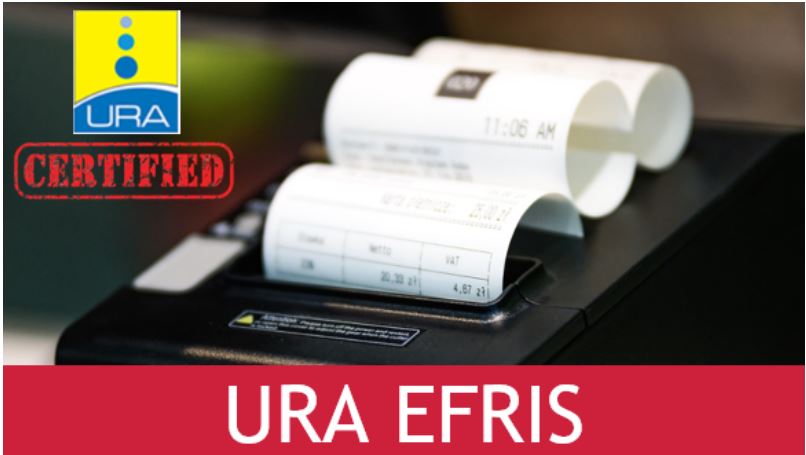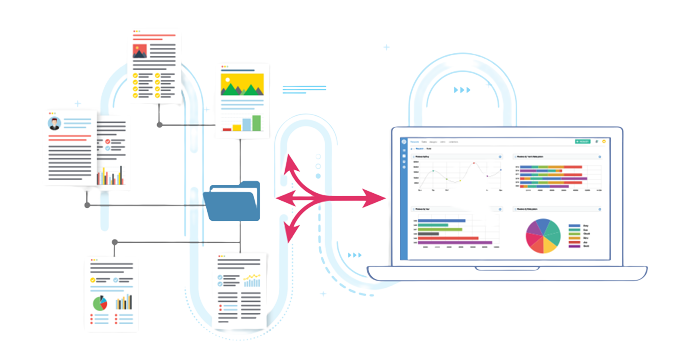
What is Electronic Fiscal Receipting and Invoicing System (EFRIS) in Uganda?
Electronic Receipting and Invoicing System (EFRIS) is an automated compliance process established by the URA which aims to handle the allocation and centralized tracking of all invoices and receipts by specified taxpayers in Uganda. EFRIS, or Electronic Fiscal Receipting and Invoicing Solution is introduced to improve the ease of conducting business in Uganda. It refers to the use of Electronic Fiscal Devices (EFDs), e-Invoicing, or direct communication with business transaction systems to handle the issuance of e-invoices
EFRIS entails the use of Electronic Fiscal Devices (EFDs), e-Invoicing, or direct communication with business transaction systems to manage the issuance of e-receipts and e-invoices in accordance with the Tax Procedures Code Act 2014.
Once a transaction is initiated using any of the solution’s components, transaction details are transmitted to URA in real time to generate e-receipts and e-invoices.
Electronic Fiscal Registration and Invoicing Systems (EFRIS) often bring several benefits to financial processes, businesses, and governments. While the specific advantages may vary depending on the implementation and context
How does the EFRIS platform work?
As per the latest regulation passed by the Uganda Revenue Authority (URA), all businesses registered in Uganda are required to register with the EFRIS system through the tax authority’s website. Here’s a quick rundown of how the EFRIS platform works:
Pre-registration:
- Business registers on the URA website
- Once logged in, the business gets verified through a One-time password (OTP) sent via sms or email
- Post that, they are required to indicate the type of invoicing system they are using – whether it is EFD or e-invoicing.
- Once done, the business needs to furnish more details, including the taxpayers’ details (these details are auto-filled from the e-tax), the purpose of registration, and the upload of supporting documents, e.g., business license.
- Once the business is registered and verified as a system user, the business account will be enabled and help you access EFRIS functionalities.
Generating e-invoice:
- Post this, a certificate issued by a local certification authority must be requested to sign invoices.
- The e-Document is sent to the EFRIS platform, which authenticates the invoice by including four mandatory fields – Fiscal Document Number (FDN), Invoice Identification Number, Verification Code, and QR Code to identify the invoice.
- The invoice must be sent to the receiver with the data entered by the platform.
How to send e-Invoices to the EFRIS?
There are many implementation models for connecting to the EFRIS platform and sending e-invoices:
System to system channel: Applicable for taxpayers with automated accounting systems, particularly those with high transaction volumes.
URA web portal channel: Suitable for taxpayers with less volume of transactions since it needs manual intervention
Client application: This option is applicable for taxpayers without ERP systems or entities that issue invoices in the field or remotely
USSD quick code option: This can be used by mobile phone users who don’t have access to smart phones and therefore this option can be used to raise e-invoices even when offline. It involves following prompts on the mobile phone to generate the e-invoice. However, this option is not yet available.
Electronic Fiscal Devices: Intended for use by retailers/cash sales
Advantages of EFRIS
Improve bookkeeping skills: Since the EFRIS system requires the business inventory to be always updated, it enables businesses to keep track of inventory and cash flow accurately, thereby keeping the accounting processes updated.
Track transactions: The EFRIS system provides assistance with tracking and authentication of business transactions in real-time. This, in turn, allows businesses to get the total number and value of receipts raised periodically.
Quick refund claims: Since all the required information for refunds is available on the URA website, compiling and accessing data is a comparatively faster process. This, in turn, helps fast-tracking the process of refund claims using e-receipts/e-invoices.
Seamless digital process: Storing and keeping track of physical documents is a cumbersome process. The introduction of EFRIS addresses the issue. Since everything is digitally stored, there’s no bulk storage, and you reduce the risk of theft.
Simplified tax process: The introduction of EFRIS helps in obtaining prefilled tax returns. Since the data is already in the system, the process is simplified for the taxpayer.
The introduction of EFRIS enables taxpayers to keep track and validate all business transactions, minimize delays and cost involved in filing tax returns, increase compliance, thereby simplifying the process of conducting business in Uganda.
Read more https://ura.go.ug/en/efris/
Frequently Asked Questions
- Improved Efficiency:
- EFRIS automates and streamlines financial processes, reducing manual efforts associated with traditional paper-based systems. This leads to increased efficiency in generating, managing, and processing fiscal documents.
- Real-time Tracking and Reporting:
- EFRIS enables real-time tracking of financial transactions, allowing businesses and governments to generate reports instantly. This provides a more accurate and up-to-date view of financial data.
- Reduced Compliance Risks:
- EFRIS systems are designed to help businesses comply with fiscal regulations and tax requirements. By automating compliance processes, organizations can reduce the risk of errors and ensure adherence to financial regulations.
- Enhanced Accuracy:
- Automated data entry and validation in EFRIS contribute to increased accuracy in financial records. This minimizes the likelihood of errors associated with manual data entry.
- Faster Invoicing and Payments:
- EFRIS accelerates the invoicing and payment processes, reducing the time it takes to create, send, and receive invoices. This can lead to improved cash flow for businesses.
- Cost Savings:
- By eliminating paper-based processes and reducing manual tasks, EFRIS can result in cost savings associated with paper, printing, and manual labor.
- Enhanced Security:
- EFRIS systems often include security features to protect financial data. Encryption, authentication, and authorization mechanisms help ensure the confidentiality and integrity of financial information.
- Integration with Other Systems:
- EFRIS can be integrated with other financial and enterprise systems, creating a seamless flow of information across different departments and functions within an organization.
- Business Intelligence and Analytics:
- EFRIS systems provide valuable data that can be used for business intelligence and analytics. Organizations can gain insights into financial trends, customer behavior, and overall performance.
- Customer Satisfaction:
- Faster and more accurate invoicing can contribute to improved customer satisfaction. EFRIS helps businesses provide timely and error-free financial documents to clients.
- Government Revenue Collection:
- EFRIS can enhance government revenue collection by providing better visibility into business transactions. It reduces opportunities for tax evasion and improves the accuracy of tax assessments.
- Adaptability to Regulatory Changes:
- EFRIS systems are designed to be adaptable to regulatory changes. This flexibility allows organizations to stay compliant with evolving fiscal regulations.
- Compliance with Tax Regulations: Integration with EFRIS ensures compliance with Uganda's tax regulations, particularly regarding the issuance of fiscal receipts and invoices. Compliance helps traders avoid penalties, fines, or legal consequences for non-compliance with tax laws.
- Reduced Tax Evasion: EFRIS aims to curb tax evasion by enabling real-time monitoring and reporting of transactions. By generating electronic fiscal receipts and invoices through the system, traders contribute to a more transparent and accountable tax system, thereby reducing opportunities for tax evasion.
- Streamlined Reporting Processes: EFRIS integration streamlines the reporting process for traders by automating the generation and submission of fiscal data to the Uganda Revenue Authority (URA). This automation reduces the administrative burden associated with manual reporting, saving time and resources for traders.
- Enhanced Business Efficiency: The use of electronic fiscal receipts and invoices through EFRIS can enhance the efficiency of business operations. It simplifies record-keeping, improves accuracy in financial reporting, and facilitates easier reconciliation of transactions, leading to smoother business processes.
- Improved Customer Experience: Electronic fiscal receipts issued through EFRIS provide customers with digital records of their transactions, enhancing transparency and accountability in business dealings. This can contribute to improved customer satisfaction and trust in the trader's business.
- Access to Government Services: Compliance with EFRIS requirements may be necessary for traders to access certain government services or participate in public procurement processes. Integration with EFRIS ensures that traders meet the eligibility criteria for such opportunities.
- Support for National Development: EFRIS integration aligns with the Ugandan government's efforts to modernize tax administration and promote economic development. By contributing to a more efficient and transparent tax system, traders support broader national development objectives.
